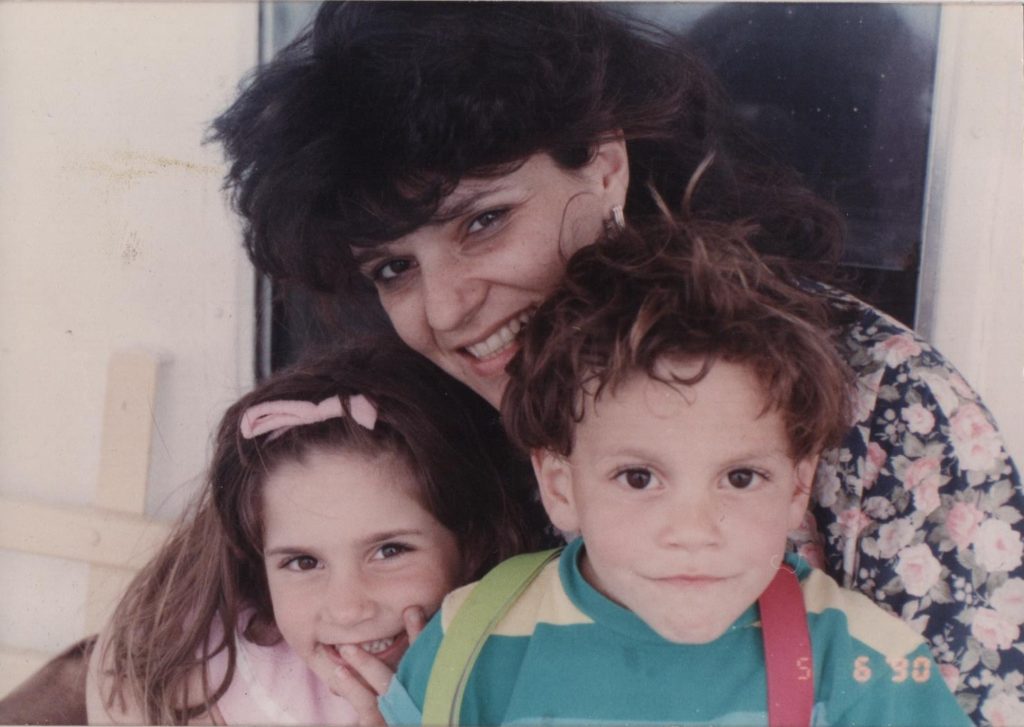
Mom, Philip and myself in 1990
Lady got poisoned last night – our 9-month-old terrier whom we all loved, but especially you. This morning we both got up early, so I decided to take you down to the beach to tell you.
“I want Lady – I don’t want Lady to die – I want to see her – I want to play with Lady,”
Those are the things you said, as you cried, over and over again.
I sat by her bed in silence, I held her hand, my eyes slightly swollen from the crying. I was wearing faded blue jeans and a black t-shirt that read, “Kiss me, I’m Greek” in calligraphy that day – why wouldn’t I be wearing such an awful ensemble, on such an important day? Then again, I couldn’t have known its significance when I was getting dressed that morning. My father, Philip and I had exited my mom’s doctor’s office less than a half hour before,
“I am very sorry that I have to tell this wonderful family such sad news,” said the doctor, “however, there is nothing else that can be done from a medical perspective. Your mother, your wife, we predict, has between four to six months left.”
My eyes still well up as I remember that moment. The small, white, bare room, the doctor leaning against his desk, his hands locked as if he were praying and the feeling in my throat, as I inhaled the wafting scent of devastation that filled the air. As I write these words, I try to hold back tears, just like I did 12 and a half years ago. I looked to my right, where Philip and my father sat next to me and noticed the glistening layer covering their corneas. Neither was blinking. If they did, they would push the layer downward and tears would roll; I know this because that’s what I was thinking about as I, myself, tried to keep my eyes wide open. If I didn’t blink, if I didn’t cry, maybe I could keep everything from moving on.
We left the room and saw one of my aunts, my father’s eldest sister, who had just come by to visit my mom. She saw me crying and scolded me,
“Don’t cry, don’t let your mother see you crying! She will know that something is wrong.”
This angered me. As if she needed me to be crying to know that her body was deteriorating. As if she didn’t know already! How much more could I suppress my pain and anguish, anyway? I was getting up every day, wasn’t I? I continued to exist, to speak, to breathe; what more could I do. I snapped something at my aunt. I’m sure I was rude, I’m sure she forgave me for it. I dried my tears and entered my mom’s room.
She was lying in her bed, calm, wearing one of her white cancer caps, hooked up to IVs, the catheter lightly coiled at the bottom of the bed, the bag of urine half-full, her cheeks sunken, her skin discolored. I wouldn’t want her to go on like this anyway, I thought. Life like this, isn’t life, not her life. At 20 I didn’t realize how young 49 really is, however, I still recognized that it was too early in one’s life to be stripped of simple decencies and definitely too early for this woman, who faced adversity with supreme dignity, to be forced into a state of toddler-level dependency.
I sat down, held her hand,
“Hi, baby,” she smiled at me.
We sat in silence for a bit. I was trying to suppress the urge to cry, again. When I finally felt ready, I dove right in,
“Mom, how am I supposed to continue my life without you? How am I supposed to continue pretending to care about anything when you are gone? I mean, I’m going to be sitting in one of my international relations courses next year and when my professor asks a question about the Cold War, I’m going to, what? Raise my hand? Why will I care?”
I was extremely calm, my practicality had kicked in. This wasn’t emotional anymore, this was pragmatic: How am I supposed to deal with your dying and not cry all day, every day, and go on with my life, was the issue.
She looked me straight in the eyes, smiled and responded,
“You will, sweetheart, you just will. When Grandpa Philip died,” her voice cracked a bit, “you just will.”
She fixed her pillow a bit, squeezed my hand and continued,
“In the beginning, when I die, everything will remind you of me. Even the smallest thing. You might burst into tears for any reason. The sound of my voice, a picture, a note, it will fill you with emotions, sorrow, grief, love, loss. After a few years, that will slowly change and start to happen mostly on important dates or significant moments for you and me. Birthdays, Christmas, Anniversaries, Graduation. Your wedding day. Your first child. You will wish I was with you to share them with you. And finally, you will reach a point when, whenever you think of me, you will smile and feel warmth and happiness in my memory, in the memory of us.”
And thus, it was.
My mom’s version of the three stages of grief. It isn’t scientific, it isn’t quantifiable, it is incredibly human and personal. It has proven accurate as far as I’m concerned. I think I’m somewhere between the second and third stage at the moment, perhaps with this digital conversation I will propel myself firmly into the final stage.
Most people are familiar with the concept of the Five Stages of Grief. Some may even know that the name of the psychiatrist who developed these stages is Elizabeth Kübler-Ross and others may go so far as to know in detail what the five stages are and how they are said to manifest. I was vaguely familiar with the concept when my mother was dying. I can’t say that I spent too much time thinking about the stages other than to conclude that if these five stages were correct, “Denial – Anger – Bargaining – Depression – Acceptance,” I was stuck in the Anger stage from the age of five. Actually, I was mostly angry and would frequently leap-frog over bargaining and nestle myself in the warm, hypnotizing embrace of depression. It wasn’t until years after my mom’s death that Acceptance felt like a possibility.
Unfortunately, my young mind, my immature emotional world when this all started and the conditions of my mom’s illness, the way that cancer devours you slowly before you can free yourself from its grasp – through death or through a clean bill of health – meant that I internalized the impending loss before the time came. Always an overachiever, I wanted to get to the finish line as fast as possible. Looking back, I realize that it was an ill-conceived, probably subconscious, attempt to protect myself from the inevitable. If I mourned her loss now, it would be easier when the time actually came. Today, I question the strategic merit of this plan, but hindsight is always 20-20 and, well, I was five.
Fortunately, my mom gave us an additional fifteen years to get to know her, to be raised by her, to confront the eventual loss with a greater emotional arsenal. By the time I was twenty, my mom and I had already started our procession into friendship, moving beyond the strict mother-daughter lines. So, we communicated a lot, she shared her feelings about having cancer, her fears, her angst and I was able to support her and have calm conversations about all of it. Surely, I could have been better, I could have been more mature, had shown more support, exhibited fewer instances of young-adult tantrums, fewer selfish moments, but, looking back again, I know that my mom and I closed our earthly chapter together, with awareness and at peace.
The doctor gave us the prognosis in mid-July 2005, but the four-to-six months prediction proved generous, as my mom passed away less than three months later. Her predictions, however, were spot on. Coming to terms with her death has been an arduous process, for all of us and extremely different for each one of us. We each carry our own agonizing baggage, informed by two things as far as I can tell: first, by the state of our relationship with my mom before she died and second, by the state of our relationship with ourselves and society as we continue to navigate life in her absence.
If you are going through loss, if you are experiencing the aftermath, trying to climb out of the emotional chasm, I’d say that you should be kind and understanding, first and foremost, towards yourself and second, to the other people engaging in their own uphill battle.
The truth remains, however, that no matter how accepting I am of my mom’s death, ever so often, I find myself echoing the pleas of my four-and-a-half-year-old self,
“I want mom – I don’t want mom to die – I want to see her – I want to play with mom.”
